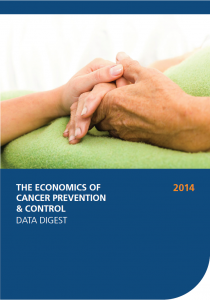Developed for the World Cancer Leaders’ Summit 2014, with the input of the Vitality Institute
Introduction
With the adoption of the UN Political Declaration on Non-communicable Diseases (NCDs) in 2011, the worlds political leaders acknowledged the enormity of the NCD burden and the threats NCDs pose to human, economic and social development. Even so, the staggering risk that cancer and other NCDs pose to economic growth and development is still only just starting to receive broad attention.
As discussions around the post-2015 framework accelerate, now is the time to move from global commitments to national action around cancer. The onus is on the cancer community to demonstrate that solutions to prevent and manage cancer exist, are accessible in all resource settings, and deliver a return on investment allowing governments to justify placing cancer control at the heart of their national health plans.
UICC has drawn on its network of experts to bring together a snapshot of the current global evidence base on the economic costs and the return on investment (ROI) in taking on proven strategies for cancer prevention, early detection and health systems strengthening. Our aim is to raise awareness of the importance of framing the debate around the cost of inaction and the case for investment to save lives as a driver for positive change and to build momentum for further work in this area.
Investing in cancer control saves lives and makes financial sense.
Making an economic case for investment in cancer prevention and control is becoming more important year on year. UICC members and partners are committed to producing robust information to help governments around the world justify their investment in addressing a disease that is rapidly impacting low- and middle- income countries – those least able to control cancer effectively.

To read full report, click here.






